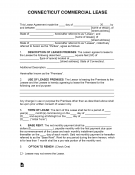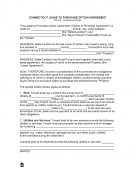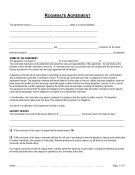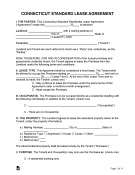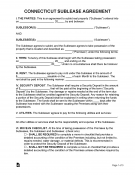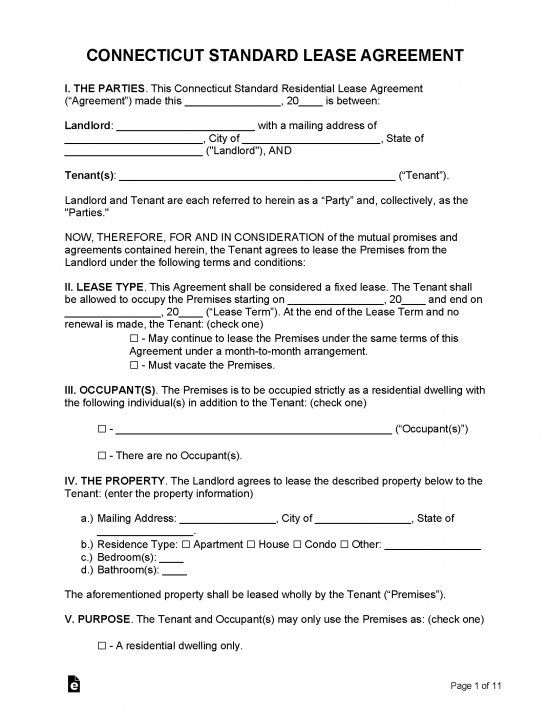Connecticut lease agreements are documents that set out the terms of a contract for a tenant to lease property from a landlord in exchange for rent. The agreements are in writing and will include the amount of rent to be charged and the rights and responsibilities of the tenant and landlord. A lease agreement can help prevent disputes between a landlord and a tenant by making the terms of the tenancy clearer. Both parties should keep a copy of the document.
Contents
- Connecticut Lease Agreements: By Type (6)
- Landlord-Tenant Laws
- Handbooks and Guides
By Type (6)
- Commercial Lease Agreement
- Rent-to-Own Lease Agreement
- Month-to-Month Lease Agreement
- Roommate Lease Agreement
- Standard Lease Agreement
- Sublease Agreement
Download: Adobe PDF, MS Word, Rich Text Format
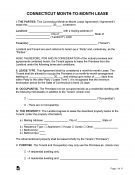 Month-to-Month Lease Agreement
Month-to-Month Lease Agreement
Download: Adobe PDF, MS Word, Rich Text Format
Download: Adobe PDF, MS Word, Rich Text Format
Download: Adobe PDF, MS Word, Rich Text Format
Download: Adobe PDF, MS Word, Rich Text Format
Download: Adobe PDF, MS Word, Rich Text Format
Landlord-Tenant Laws
Statutes – Title 47a (Landlord and Tenant)
Required Disclosures (4)
Common Interest Community Disclosure (§ 47a-3e) – If the residence located in a common-interest community this disclosure must be attached.
Landlord Identity (§ 47a-6) – The Owner/Agent is required to identify themselves in the form and list where the tenant may send legal notices.
Landlord-Tenant Guide – The Rights and Responsibilities Guide should be given to every tenant in order for them to be aware of any and all State laws.
Lead-Based Paint Disclosure – According to federal law, all residential units built prior to 1978 must include this disclosure.
Security Deposit Laws
Maximum Amount ($)
For tenants under sixty-two (62) years of age, landlords may require a security deposit that is up to twice the monthly rent. For tenants over sixty-two (62) years of age, landlords may require a security deposit that is no more than one (1) month’s rent (§47a-21(b)).
Returning to Tenant
Either 15 days after the tenant has provided a new address to the landlord or thirty (30) days after the termination of the tenancy, whichever is later, the landlord shall send to the tenant the full amount of the security deposit plus accrued interest. The landlord may send less than this amount only if there are repairs necessary for the unit that resulted from the tenant’s failure to comply with his or her obligations under the rental agreement. In order to deduct from the security deposit, the landlord must include a written itemization of the expenses, including description and price for each deduction ((§47a-21(d)).
When is Rent Due? (grace period)
The landlord and the tenant can decide when and where rent is due in the lease agreement. There is a grace period of nine (9) days before the landlord may initiate proceedings to terminate the less agreement. (§47a-15a).
Eviction Notice (non-payment)
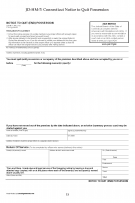 Notice to Pay or Quit – The landlord has the right to give the notice to quit if rent is not paid within the grace period. If not paid in full, the landlord has the right to terminate the lease and begin a forcible entry and detainer action (§47a-23).
Notice to Pay or Quit – The landlord has the right to give the notice to quit if rent is not paid within the grace period. If not paid in full, the landlord has the right to terminate the lease and begin a forcible entry and detainer action (§47a-23).
Download: Adobe PDF
Maximum Fees ($)
Late Rent Penalties
In Connecticut, landlords are not permitted to collect late fees for delinquent rent (§47a-4).
NSF Checks
Connecticut does not set a maximum fee for checks with insufficient funds, but any such fee should likely be included in the rental agreement, and must be of a reasonable amount in order to be enforceable.
Tenant’s Unclaimed Property
If a tenant has been deemed to have abandoned property, the landlord must take inventory of any personal property left behind and keep it for the tenant to reclaim for at least thirty (30) days.
If the tenant does not reclaim the property within 30 days, the landlord may do what he or she chooses with the property (§47a-11b(d)).
In the case of property left behind by a tenant who has been evicted, the state marshal carrying out the eviction should take everything to a designated place of storage. The tenant must pay the fee associated with storing the property to the chief executive officer of the town where the property is located within 15 days of the eviction. If this amount is not paid, the officer may sell the property in a public sale taking place no sooner than 1 week after the expiration of the 15 days, use the proceeds to satisfy the storage costs and return the remainder to the tenant (§47a-11b(e)).
